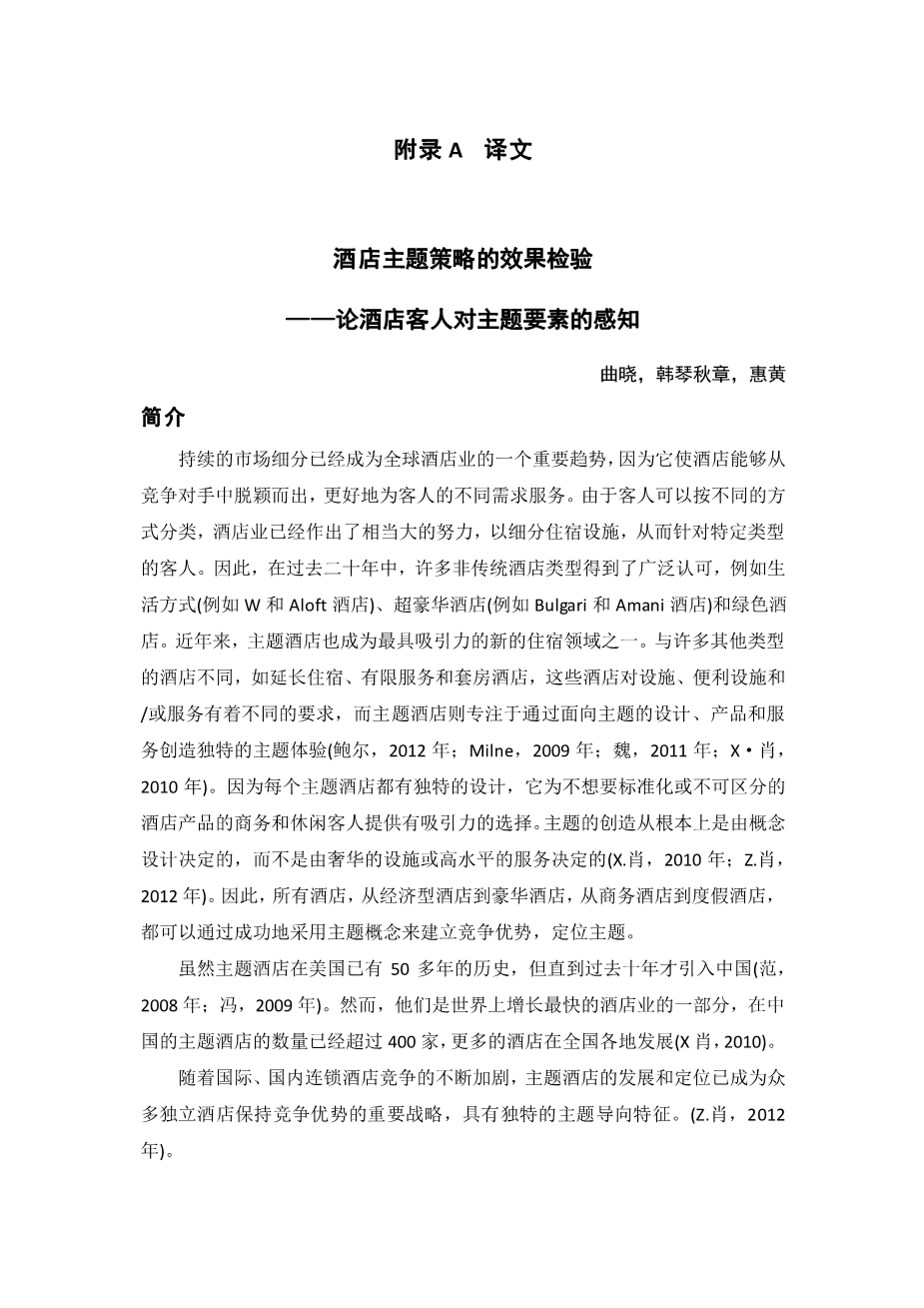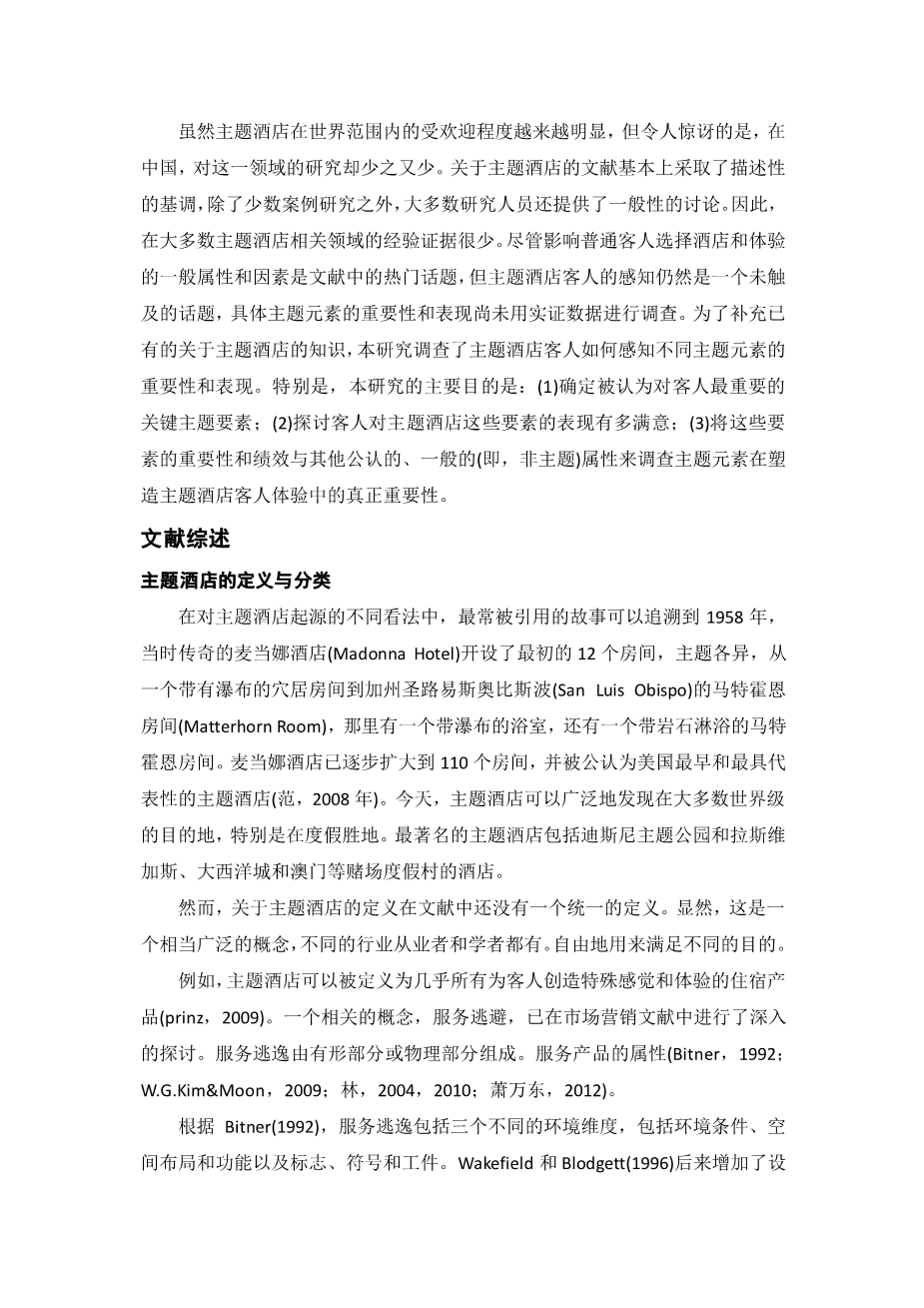The Effects of Hotel Theme Strategy: An Examination on the Perceptions of Hotel Guests on Theme Elements
QU XIAO
HANQIN QIU ZHANG HUI HUANG
Theme hotels are a relatively new hotel type resulting from the continuous development of market segmentation trends in the lodging industry. The unique experience created by a theme hotel is the hotel’s key competitive advantage and differentiator. This is the first quantitative study of theme elements to include empirical data. Using importance– performance analysis, it examines the perceived importance and performance of 10 theme-related attributes among hotel guests. The results indicate that a theme hotel’s basic facilities and services are perceived as more important than its theme elements, and hotel guests are generally more satisfied with basic facilities and services than with theme elements. The findings suggest that theme culture should be further developed and enhanced in theme hotels.
KEYWORDS. Theme hotel, hotel attributes, hotel performance, guest satisfac- tion, China’s hotel industry
Qu Xiao is an Assistant Professor in the School of Hotel and Tourism Management at The Hong Kong Polytechnic University, Kowloon, Hong Kong, China (E-mail: qu.xiao@polyu.edu.hk). Hanqin Qiu Zhang is an Associate Professor in the School of Hotel and Tourism Management at
The Hong Kong Polytechnic University, Kowloon, Hong Kong, China (E-mail: hanqin.zhang. qiu@polyu.edu.hk).
Hui Huang is the Director of Operations at the Seaview O-City Hotel, Shenzhen China (E-mail: nancyhuangon@hotmail.com).
Introduction
Continuous market segmentation has become an important trend in the hotel industry worldwide, because it allows hotels to differentiate themselves from their competitors and to better serve the diverse needs of guests. Because guests can be classified in various ways, considerable efforts have been made in the hotel industry to segment lodging facilities and thereby target specific types of guests. As such, a number of nonconventional hotel types have become widely recognized in the past two decades, such as lifestyle (e.g., W and Aloft hotels), super luxury (e.g., Bulgari and Amani hotels), and green hotels. The theme hotel has also emerged as one of the most attractive new lodging segments in recent years. Unlike many other hotel types, such as extended-stay, limited-service, and suite hotels, which have distinct requirements related to facilities, amenities, and/or services, theme hotels focus on creating unique theme experiences through theme-oriented designs, products, and services (Bower, 2012; Milne, 2009; Wei, 2011; X. Xiao, 2010). Because each theme hotel is uniquely designed, it offers attractive alternatives to business and leisure guests who do not want standardized or indifferentiable hotel products. The crea- tion of a theme is determined fundamentally by a concept design and not by luxurious facilities or a high level of service (X. Xiao, 2010; Z. Xiao, 2012). Therefore, all hotels, ranging from economy to luxury properties and from business to resort hotels, could establish a competitive advantage by successfully adopting a theme concept.
Although they have a more than 50-year history in the United States, theme hotels were not introduced to China until the last decade (Fan, 2008; Feng, 2009). Nevertheless, they are part of the world’s fastest-growing hotel industry, and the number of theme hotels in China has been recorded at more than 400 properties, with more in development across the country (X. Xiao, 2010). Because the competition from international and domestic chains has been constantly increasing, the develop- ment and positioning of theme hotels have become important strategies for many independent properties to stay competitive with unique theme-oriented features (Z. Xiao, 2012).
Though the worldwide popularity of theme hotels has become increasingly evident, surprisingly little research has been conducted on this segment in China. The literature on theme hotels has taken a primarily descriptive tone, and most researchers have offered general discussions in addition to a few case studies. As such, empirical evidence in most theme hotel-related areas is rare. Although the general attributes and factors affecting regular guests’ hotel selections and experi- ences are popular topics in the literature, the perceptions of theme hotel guests remain an untouched topic, and the importance and performance of specific theme elements have not yet been investigated with empirical data. To supplement the established knowledge on theme hotels, this exploratory study investigated how theme hotel guests perceive the importance and performance of different theme elements. In particular, the primary purposes of this study were to (1) identify the key theme elements perceived to be the most important to guests, (2) explore how satisfied guests are with a theme hotel’s performance of these elements, and (3) compare the perceived importance and performance of these elements with those of other well-recognized, general (i.e., non-theme) attributes to investigate how much theme elements really matter in shaping guests’ experiences in theme hotels.
Literature Review
Definition and Classification of Theme Hotel
Among the different views on the origins of theme hotels, the most cited story dates back to 1958, when the legendary Madonna Inn opened its first 12 rooms, with different themes ranging from a caveman room complete with a waterfall to a Matterhorn room with a rock shower, in San Luis Obispo, California. The Madonna Inn has gradually expanded to 110 rooms and is recognized as the earliest and most representative theme hotel in the United States (Fan, 2008). Today, theme hotels can be widely found in most world-class destinations, particularly in vacation-oriented resorts. The most prominent theme h
全文共13392字,剩余内容已隐藏,支付完成后下载完整资料
英语译文共 8 页,剩余内容已隐藏,支付完成后下载完整资料
资料编号:[451807],资料为PDF文档或Word文档,PDF文档可免费转换为Word
以上是毕业论文外文翻译,课题毕业论文、任务书、文献综述、开题报告、程序设计、图纸设计等资料可联系客服协助查找。
您可能感兴趣的文章
- COVID-19时期的旅游业和可持续发展:以西班牙为例外文翻译资料
- 农民相对剥夺感对乡村旅游可持续发展的影响机制外文翻译资料
- 校园大学生的旅行行为——以亚洲某乡村大学为例外文翻译资料
- 内容旅游与地方社区响应:鹫宫的“幸运之星”和“协作动漫旅游”外文翻译资料
- 基于符号互动理论的遗产旅游资源开发与重塑——以良渚古城遗址为例外文翻译资料
- 在TikTok上映射互联网名人:探索注意力、经济和可见性劳动力外文翻译资料
- 基于社区游客视角的环境责任行为的概念和度量外文翻译资料
- 温泉小镇的再造:维希的独特案例——副标题外文翻译资料
- 基于IP理念的桐乡丰子恺文化旅游开发研究外文翻译资料
- 特殊事件对旅游业的影响及其应对措施研究——新冠肺炎疫情对全球旅游业的影响及其应对措施外文翻译资料




